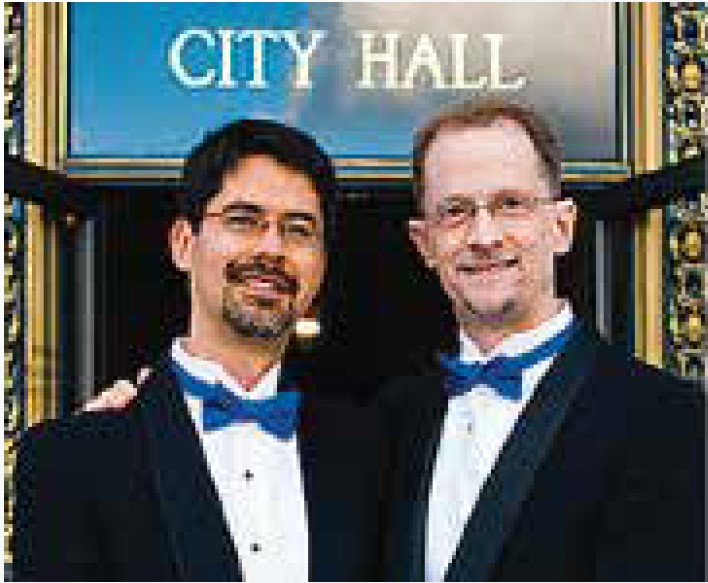
By Stuart Gaffney and John Lewis–
It is a truism that musicians and artists often do not receive recognition in their lifetimes. And so it is with the 1960s and ’70s gay musician, the late Peter Grudzien, who wrote and sang outsider psychedelic country music as part of the Greenwich Village folk and bluegrass music scene of the time.
Grudzien’s music ascended to the national stage–literally–last month when renowned folk musicians Nora Brown and Stephanie Coleman sang their rendition of Grudzien’s haunting but hopeful 1974 melody “The Unicorn” as part of their protest performance at the Kennedy Center. Characterizing the Kennedy Center as both “our country’s national cultural center” and “a radical space,” the music duo unfurled and hung banners reading “Reinstate Queer Programming” and “Creativity at the Kennedy Center Must Not Be Suppressed” during their concert.

While many prominent artists canceled already-scheduled Kennedy Center performances as a means of protesting the Trump administration’s takeover of that esteemed institution, Brown and Coleman chose a different path. In a joint statement, part of which they read on stage, they explained that they “believe[d] the most effective form of protest for us will be expressing disapproval, loudly, inside the institution where the voices of artists are actively being silenced.” Brown added in a Democracy Now! interview that they “ended up deciding that our voices would be loudest on the stage” itself.
In their statement, the pair expressed that they were “outraged by the tyrannical change of leadership at the Kennedy Center” and articulated how through “weaponizing the Kennedy Center’s stages, Trump has systematically sought to silence Queer and BIPOC artists.” They emphasized how they were “particularly disturbed by the recent cancellations of two pride month concerts featuring the International Pride Orchestra and the Gay Men’s Chorus of Washington.”

Accordingly, Brown and Coleman chose to include in their setlist a song by the queer outsider musician Grudzien, whom Brown recognized as “the first gay male country musician.” Grudzien lived with a medical diagnosis of paranoid schizophrenia, but instead of marginalizing him, Brown heralded him as “an incredible and unique songwriter.” Brown and Coleman consider Grudzien’s music to be part of “the robust culture of resistance that American folk music has always championed” and hoped to evoke a “spirit of dissent and joy” by performing one of his songs.
Grudzien’s The Unicorn album and its signature song of the same name do just that and were written decades before the rainbow unicorn became a hugely popular queer icon. The song’s lyrically opaque verses first give voice to human longing for comfort, speaking of our seeking “to find someone half-blind, somebody who will make us new, to hold in the night, to guard us from fright.” The second verse describes a disturbing image of the singer’s “search for a way to tear out my eyes so I won’t see the dying tree fall to its knees, and as it must with fragments of lust, return to dust, [and] then we are gone in the night.”

The final verse depicts a dark dystopia that, in retrospect, could be seen as portending the cowardly capitulation of some individuals and institutions to Trump. It describes a “crowded” “sanctuary” where “poisons are all passed around” and how “our eyes leave our head” as “the zombies are dead, just walking around, held to the ground, our feet are bound, obeying each sound, waiting to meet God knows who.”
But after each troubling verse, hope emerges from the song’s chorus that evokes the magic of the mythical unicorn to reawaken us to the restorative power of our love for and embrace of vibrant queerness. The chorus proclaims:
While in our very city there lives a Unicorn of old
The Queen that holds the Unicorn
Will be reborn
His mighty horn
Calls on that day
Storms pass away
Night turns to day
The whole world is gay
Angels descend from the sky
A slight variation of the chorus, sung after the second verse’s recounting of the death of a tree, takes it a step further by revealing that “a real live Unicorn” is, in fact, alive in “our city.” That “real live Unicorn” is our inner strength that lies within us as LGBTIQ people and within the broader queer and allied community. The Queen “captures the Unicorn” and upon her “just touching its hand,” she recognizes “wisdom is hers,” gains “focus from blurs,” and “possessing the key, [she] brings life to the tree, and makes it grow taller again.”
The unicorn has become a queer icon for many reasons, including its rare beauty, magical aura, and gender fluidity over time, as well as its capacity to evade true capture as Leonardo da Vinci described “its intemperance and not knowing how to control itself.” Grudzien, composing and singing “The Unicorn” in 1974, just five years after Stonewall, employs the centuries-old image of the mythical animal to remind us that the spark of creative resistance that ignited the history-changing riots was not something that existed just on a few warm summer nights in late June 1969, but always resides within us.
Brown and Coleman embodied that spirit over a half-century later on stage at the Kennedy Center. We believe we all possess the unicorn’s ultimate magical power to renew from within in the face of adversity and to transform the world into a better place for LGBTIQ people and others alike. Thank you, Peter Grudzien.
A recording of Peter Grudzien singing “The Unicorn” may be found at:
https://bit.ly/4i2ZgFm
John Lewis and Stuart Gaffney, together for over three decades, were plaintiffs in the California case for equal marriage rights decided by the California Supreme Court in 2008. Their leadership in the grassroots organization Marriage Equality USA contributed in 2015 to making same-sex marriage legal nationwide.
6/26 and Beyond – Emerging Resistance
Published on April 10, 2025
Recent Comments